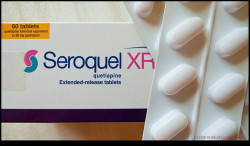Seroquel (quetiapine) Coupons, Discounts & Cost
Seroquel (quetiapine) belongs to the class of atypical antipsychotics. One way to save money on the Seroquel (quetiapine) retail cost regardless of income and insurance status is to use Seroquel (quetiapine) coupons or discount cards from RXCoupons. Use our Seroquel (quetiapine) coupons at your online pharmacy and receive up to 75% off the sale price each time you refill your prescription.
Seroquel (quetiapine) pharmacological action
Seroquel (quetiapine) belongs to the class of atypical antipsychotics. The drug is well tolerated when taken in recommended doses (including elderly patients).
Seroquel (quetiapine) indications for use
- Treatment of acute and chronic psychosis, including schizophrenia; - Treatment of the manic phases of bipolar disorder; - Treatment of depressive episodes of moderate to severe degree.
Seroquel (quetiapine) contraindications
Do not use Seroquel (quetiapine) together with erythromycin, clarithromycin, nefazodone, protease inhibitors. The drug is contraindicated in case of hypersensitivity to any component of Seroquel.
Seroquel (quetiapine) dosage
Seroquel (quetiapine) should be taken 2 times a day, regardless of meals.
Treatment of acute and chronic psychosis, including schizophrenia: the daily dose for adults during the first 4 days of treatment is as follows: day 1 - 50 mg, day 2 - 100 mg, day 3 - 200 mg, day 4 - 300 mg.
Depending on the clinical effect, the dose can vary from 150 mg to 750 mg per day. The maximum daily dose is 750 mg.
Treatment of manic episodes in bipolar disorder: Seroquel is used as a monotherapy or as adjunctive therapy. The daily dose for adults during the first 4 days of treatment is as follows: day 1 - 100 mg, day 2 - 200 mg, day 3 - 300 mg, day 4 - 400 mg. The daily dose may be increased to 800 mg.
Depending on the clinical effect, the dose can vary from 200 mg to 800 mg per day. The maximum daily dose is 800 mg.
Treatment of depressive aspects of bipolar disorder: Seroquel is prescribed 1 time per day before bedtime. The recommended dose is 300 mg. The daily dosage for the first 4 days of treatment is as follows: day 1 - 50 mg, day 2 - 100 mg, day 3 - 200 mg, day 4 - 300 mg. The maximum daily dose is 600 mg.
The initial dose for elderly patients is 25 mg per day. The dose should be increased to 25-50 mg daily.
Patients with renal or hepatic impairment should start treatment with 25 mg per day. It is recommended to increase the dose by 25-50 mg daily.
Seroquel (quetiapine) overdose
There were very rare reports of overdose of Seroquel (quetiapine).
Overdose symptoms: drowsiness and excessive sedation, tachycardia and blood pressure reduction.
Treatment: symptomatic therapy is recommended in cases of severe intoxication. Close medical supervision and monitoring should be continued until patient recovers.
Seroquel (quetiapine) drug interactions
It is necessary to use lower doses of quetiapine in case of simultaneous administration with antifungal agents. Particular attention should be given to the elderly and patients with low immune system.
Co-administration of quetiapine with drugs that induce liver enzyme system may require increased doses of Seroquel (depending on the clinical effect).
You may need to reduce the dose of quetiapine with phenytoin or carbamazepine.
CNS depressants and ethanol increase the risk of side effects of Seroquel.
Seroquel (quetiapine) side effects
Central and peripheral nervous system: somnolence, dizziness, hyperthermia, muscular rigidity, vegetative-vascular disorders, seizures. If you have any symptoms of tardive dyskinesia, it is necessary to reduce the dose or discontinue further use of Seroquel.
Digestive system: constipation, dyspepsia, dry mouth.
Cardiovascular system: orthostatic hypotension, tachycardia, syncope.
Hematopoietic system: leukopenia or neutropenia. There were no cases of severe neutropenia or agranulocytosis in patients taking Seroquel.
Endocrine system: quetiapine therapy is associated with a slight dose-dependent decrease in thyroid hormone levels.
Allergic reactions: eosinophilia, angioedema.
Other reactions: peripheral edema, mild asthenia, rhinitis, weight gain (especially in the first weeks of treatment), priapism, high blood pressure, palpitations, dysarthria, pharyngitis, cough, anorexia, increased sweating.

